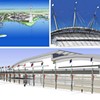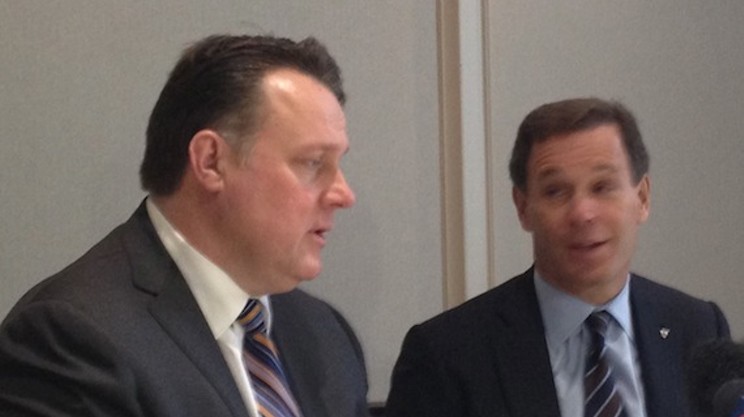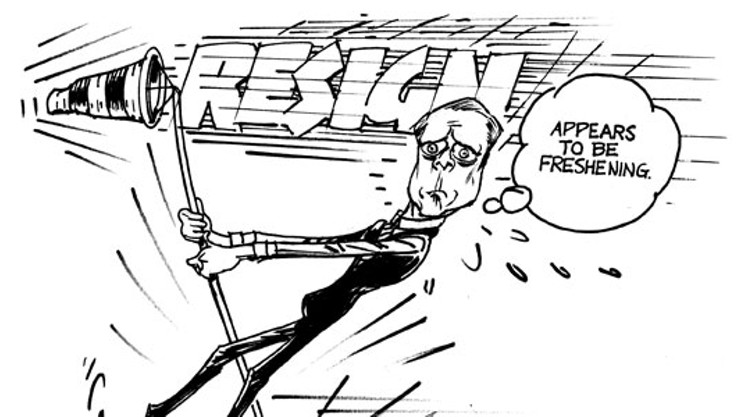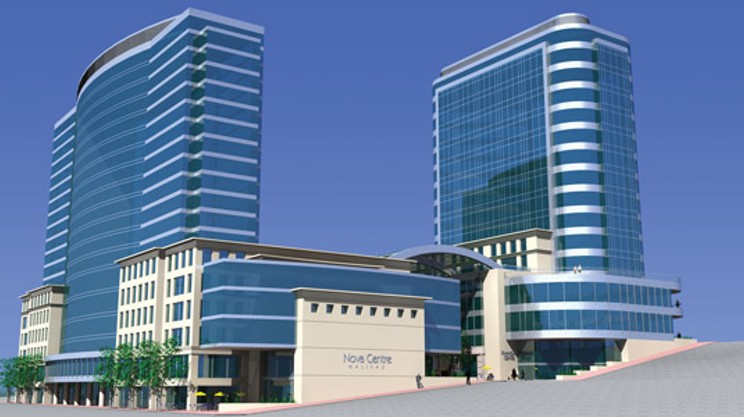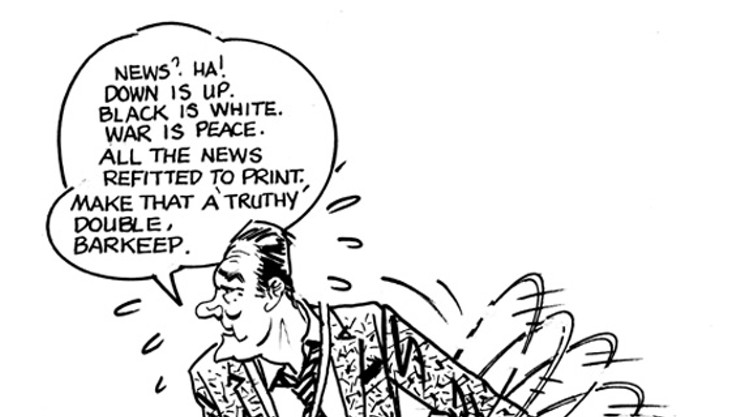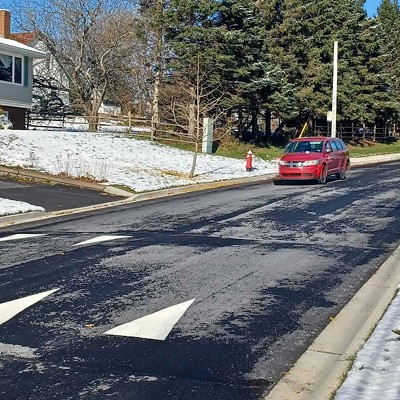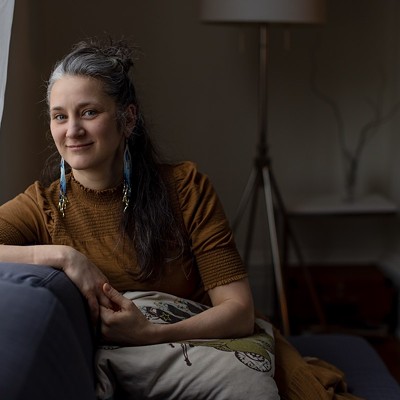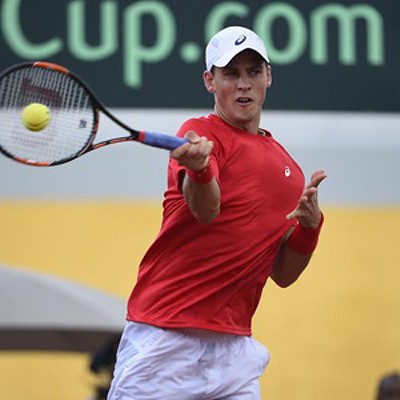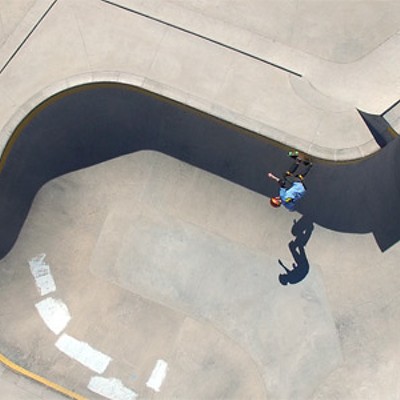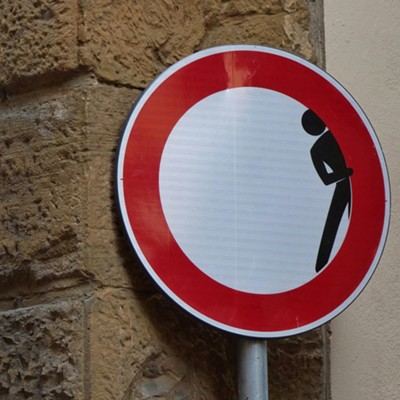Seven months after Halifax's Commonwealth Games bid collapsed, there still hasn't been full disclosure of the records of the Halifax 2014 Bid Society, the non-governmental organization put together to pursue the Commonwealth Games. Neither has there been public discussion of the decision-making process that led to the demise of Halifax's bid. So how are we to know what happened?
I set out in search of answers in the usual reporter fashion: I papered local, provincial and federal agencies with Freedom of Information requests and called up various people involved in the Games bid. That didn't get me much—a few documents, a few background discussions, but the government agencies are still withholding lots of information and a good number of public officials went out of their way to avoid talking with me.
But about a month ago I discovered a treasure trove of documents had been deposited with the legislature's public affairs committee, and has been sitting in plain sight at the legislative library, completely open to the public but also completely unread. The librarians told me I was the first and only person to ask for them.
For two weeks I lugged my laptop to the library, which is housed in the old courtroom on the second floor of Province House. I read through several thousand pages of documents as groups of tourists trampled through the library.
"This very room is where Joseph Howe brought freedom of the press to Canada," began each of the tour guides, who went on to describe how, in 1835, Howe had been charged with libel for factually reporting in his newspaper, The NovaScotian, that government authorities were abusing the public treasury for their personal profit. Howe defended himself with a rousing six-hour rebuttal of the charges and was acquitted, starting a grand tradition that led to me sitting in the very same room investigating government authorities and the public treasury.
The documents in the library included internal Halifax 2014 meeting minutes, budgets, risk assessments, travel accounts and more.
When I got to two government-sponsored consultant reports, I realized that I'd hit pay dirt. The reports blasted nearly every aspect of Halifax 2014's efforts and called on government agencies to rethink their support for the Commonwealth Games bid.
The consultant reports made clear that what was first billed as a $785 million project would end up costing upwards of $2 billion. More, the Games proposal rested on a series of dubious assumptions that were never made public, including that Halifax Regional Municipality would spend hundreds of millions of dollars over and above its announced $200 million contribution, that business support for the Games would triple or quadruple that of previous Games, and that record numbers of spectators would pay record ticket prices to watch not-very-popular sports, like badminton and lawn bowling.
Provincial officials were so alarmed by the consultant reports that after they received draft copies of them on March 5, 2007, it took just three days for officials to act. On March 8, what had previously been celebrated as great opportunity was recognized as a boondoggle, and the province pulled the plug on Halifax's Commonwealth Games effort.
Sunny skies forever
It was a typically cool and overcast fall day, but for the dozen or so federal, provincial and municipal officials gathered at Halifax's Pier 21 last November 30, the forecast was decidedly sunny.
"I am pleased to announce that Canada's new government will contribute up to $400 million to the staging of the 2014 Commonwealth Games in Halifax," said Peter Van Loan, the federal minister for sport.
As backers saw it, the opportunity to host the Commonwealth Games was an opportunity to make a lot of money. "This investment will increase our ability to build trade and investment connections with Commonwealth countries," said Peter MacKay, the federal minister of the Atlantic Canada Opportunities Agency. "Hosting the 2014 Commonwealth Games offers a once-in-a-lifetime opportunity to invest in a lasting legacy of infrastructure and community and economic development for our region," chimed in Halifax mayor Peter Kelly.
MacKay and Kelly certainly had good reason to believe the future benefits would be well worth the costs of hosting the Commonwealth Games. A report produced by Canmac Economics, a Sackville firm that specializes in economic modelling, said that if all the assumptions provided by games backers—construction costs, ticket sales, hotel bookings and so forth—held true, then the Games' $785 million price tag would generate $2.4 billion in additional industrial output for Nova Scotia, would increase the province's gross domestic product by over a billion dollars and would employ nearly 18,000 additional workers.
Beyond the numbers, the Games would bring all sorts of quality-of-life improvements to regular Haligonians, said Kelly, including "world-class sport facilities and programs, affordable housing units, improved transit systems and economic growth."
Games backers spoke of a new 50,000-seat roofed stadium at Shannon Park that, they hinted, might later be used by a CFL team. The adjacent Athletes Village would become a thriving mixed-income community on the formerly depressed Dartmouth waterfront, connected to downtown Halifax by a fast ferry, another bit of infrastructure left over from the Games. And citizens would revel in the glow of living in a truly "world class" city, one that proved its status by hosting a successful international sporting event.
To those ends, the feds promised $400 million in support of the Games, Halifax Regional Municipality another $200 million. Most of the balance—at least $165 million—would come from a combination of corporate sponsorship, licensing and broadcasting revenue.
But that money only covered the costs of holding the games, not the cost of getting the games in the first place. For that effort, the governments also gave a total of $10 million—$3.5 million from the federal government, $3.5 million from the province and $3 million from HRM—to the Halifax 2014 Bid Committee, which had been formed in March 2006 for the purpose of winning the international contest to become the host of the 2014 Commonwealth Games. That public money provided the bulk of Halifax 2014's $14.3 million total budget.
To ensure public oversight of the public money, Duff Montgomerie, the provincial deputy minister of Health Promotion and Protection, and Dan English, the top bureaucrat for HRM, sat on Halifax 2014's board of directors.
Moreover, several HRM employees, including the chief financial officer, Dale MacLennan, were "loaned" to the bid committee to work full-time on developing the Games' budget.
"I looked at it as an opportunity," says Halifax councillor Andrew Younger. "It was limited to $200 million , and we were going to do some of the projects anyway—they were going to hold the marathon along Lake Banook, and were already talking about redoing the road and sidewalks. And a fast ferry, which in my view we need to do if we're going to have a viable mass transit system, so it made sense to do that.
"Staff said we could spend $200 million without impacting the tax rate, and get some projects we needed by reprioritizing our spending. I was supportive, but not for more than $200 million."
For his part, the chief executive officer at Halifax 2014, a former Canadian national champion canoeist named Scott Logan, gave assurances that the bid budget would be kept on a short leash.
"We're not going to see the kinds of overruns that other games have seen," Logan told the CBC.
According to those collected at Pier 21, the controls would keep the price of the Games well under control. "I remain committed to ensuring that we build the right-sized Games for this province, while hosting an event that will make the entire country proud," said premier Rodney MacDonald that November day. "We are committed to a legacy that is fiscally responsible," echoed Kelly.
What could possibly go wrong?
The uncommonly wealthy games
The Commonwealth Games are an athletic contest held every four years between 71 provinces and former colonies of the British Empire. Since the very first competition, held in Hamilton, Ontario, in 1930, the Games have had a distinctive British flair to them. The required sports at each Games include synchronized swimming, lawn bowls and rugby sevens, although a broader range of perhaps more popular sports are permitted to be added by the host country.
Compared to the Olympic Games, the Commonwealth Games remained relatively low-key contests, in part because they never became an arena for the competing hyper- nationalisms of the Nazi and Cold War eras.
But that began to change in the 1990s, when, for the first time, large amounts of money began to pour into the Commonwealth Games. The 1994 Games, held in Victoria, British Columbia, cost $142 million, while the 2006 Melbourne Games cost $1.05 billion. And, the price tag for the 2010 New Delhi Games now exceeds $5.7 billion Canadian—a staggering 4,000 percent increase over the price of the Victoria Games in just 16 years.
"The Commonwealth Games were originally modelled on the 19th century colonial expeditions," says Kevin Wamsley, a sport historian and director of the International Centre for Olympic Studies at the University of Western Ontario. "They were showing off the goods of the empire. That's changed considerably lately."
The group supporting the Halifax bid, however, may have not been aware of the recent hyper-inflation because they first became involved in the Commonwealth Games process earlier on, when the Games still had more of an old-style British athletic meet feel to them.
The two most prominent people in the 2014 bid were also involved in a previous unsuccessful attempt to snag the 2010 games for Halifax. Scott Logan, CEO of Halifax 2014, and Fred MacGillivray, president of Events Halifax and the World Trade and Convention Centre and chair of Halifax 2014's board of directors, both were also board members of the 2010 bid committee.
The 2010 attempt (which occurred in 2002) failed to win even the Canadian portion of the bid contest. But in the process of preparing for that bid a feasibility study was conducted to see if it made sense financially.
The half-million dollar feasibility study was funded entirely by public money—$300,000 from ACOA and $100,000 each from the province and HRM—but ACOA refuses to make it public, even after I requested it under the Freedom of Information Act. The federal agency also won't say who it paid to conduct the study, or which firms bid on the tender.
A 2002 ACOA press release, however, mentions that the study found the proposed 2010 Games would generate some $450 million in economic activity. It therefore appears that the proposed 2010 Games were planned to be in the price range of the 1994 Victoria Games, and certainly not in the category of the 2006 Melbourne Games or the super-inflated 2010 New Delhi Games.
One possible read on events is that Logan and MacGillivray based many of their assumptions on the four-year-old feasibility study, without realizing that the entire economic framework of the Commonwealth Games had exploded several orders of magnitude in the interim. As Logan later testified before the legislature's Public Accounts Committee, "early on in the process when we transitioned from the domestic to the international process it became quite clear that the requirements for detail were far more comprehensive than we had anticipated."
"We had done no research whatsoever at that point, so we had no idea what the price would be," MacGillivray tells me last week. "But that's not surprising. These prices go up. If you look at any other athletic event held, they all go up in price. But after we got into the international bid stage, we worked hard to make sure we knew what all the costs would be up front, so that we wouldn't be coming back and asking for more money later on. Our effort was to make sure the government funders were fully informed."
In other words, no one thought to look at the new international order until after Halifax had won the Canadian side of the bid contest. Suddenly, Halifax 2014 found itself in way over its head, financially speaking.
Olympian corruption
On the other hand, the bid committee was completely prepared for what would constitute its primary task, which was not designing or planning for the games.
Rather, more than $5 million of the total $14.3 million Halifax 2014 budget—fully 35 percent—was devoted to lobbying other nations' Commonwealth Games Associations to vote for Halifax as the 2014 host city.
Halifax was vying against Glasgow, Scot-land and Abuja, Nigeria, as a potential host city. The winning city is due to be named November 9 by the Commonwealth Games Federation, following a vote of the 71 CGAs.
"It has become similar to the old International Olympic Committee practice," says Wamsley, referring to the behind-the-scenes international lobbying process that exploded in scandal three years before the 2002 Salt Lake City winter Olympics.
The president and vice president of the Salt Lake City bid committee resigned after admitting to bribing IOC officials to vote for Salt Lake City as host city for the Olympics. The fallout from that scandal resulted in several changes to Olympic policy, including a prohibition on gifts and a restriction on IOC travel to potential host cities.
"But those changes never made their way over to the Commonwealth Games," says Wamsley.
As Olympic officials somewhat cleaned up their act, CGA officials have stepped in to replace them on the corruption circuit. Two Adelaide, Australia officials who worked on that city's failed 1998 Commonwealth Games bid announced in 1999 that three CGA officials—from Pakistan, Sri Lanka and an unnamed African country—had asked for "incentives" to vote for Adelaide.
"They wanted us to set up one of their children at Adelaide University and pay for their five or six years' tuition there," Adelaide mayor Steve Condous told the Associated Press.
"I believe that the time has come, for both IOC and Commonwealth Games, when these travelling circuses which provide all of these delegates with first-class air travel, top quality accommodation, tours, gifts and everything that's lavished on them, has got to come to an end," he added.
The IOC made some modest reforms, but the travelling circus aspect of the Commonwealth Games bid process continues. Detailed financial information from Halifax 2014 has yet to be released to the public—I've been able to review general budget documents and board discussion of some specific expenditures, but not itemized cheque registers or credit card records. So at this point, there's no evidence of outright bribery of individual international CGA officials.
But there's no question that Halifax 2014 was attempting to purchase the goodwill of the international CGA organizations. The process was institutionalized in Halifax 2014's "Partner Program," which doled out $700,000 in cash grants—$10,000 to each of the 70 CGA organizations other than Canada's that would later cast a vote for Halifax, Glasgow or Abuja.
The Partner Program money was intended for "sport development"—an arbitrarily defined term—in each of the countries. In February 2007, for example, Halifax 2014 agreed to purchase a scoreboard for a track in Turks and Caicos, a British territory in the West Indies.
"We are extremely pleased that through input from the Turks and Caicos CGA we have been able to fulfill a need that will not only help in the short-term, but that can be built upon to benefit athletes for years to come," Logan stated in a Halifax 2014 press release. I spent considerable effort tracking Logan down, but could not find him to comment for this article.
After Halifax councillor Gloria McCluskey objected to the out-of-country spending, MacGillivray insisted that the Partner Program had nothing to do with buying votes. "It's meant to show Canada's commitment to development of sport throughout the Commonwealth, as we have in the past," he told the Chronicle-Herald. "And we, as an international bid team, want to continue that tradition."
The Partner Program was a new strategy employed on the CGA stage, and neither Glasgow nor Abuja have followed suit.
In addition to the Partner Program, Halifax 2014 planned to bring as many countries' CGA officials as they could muster to Halifax.
On March 7, 2007, just one day before Halifax's bid crumbled, the Halifax 2014 Executive Committee was still discussing the plan. According to the meeting's minutes, about two dozen international officials were to be flown first class into Halifax and hosted at the Westin. "Fred MacGillivray raised concerns about the hotel's location and standards of service and advised that the Halifax Marriott Harbourfront be used, instead," read the minutes, but no action was taken on the complaint.
MacGillivary says those minutes are inaccurate. "I never said anything about service. It was about location. From the Marriott, you can see right across to the site of the Games."
Whichever hotel would ultimately be used, the minutes make plain that the international group would be wined and dined in the highest fashion, a characterization MacGillivray doesn't dispute. "That's what you do," he says.
The wining and dining worked both ways: Halifax 2014 representatives would also fly around the world. The bid committee put together a "Faces of the Bid" team consisting of Logan, MacGillivray, and Andrew Pipe and Tom Jones, board members who also sat on the Canadian national CGA.
The "Faces" would do most of the travelling, but they were often accompanied by two people who had previously worked on the 2006 Melbourne Games and were hired by the Halifax group—Kate Randall, who was brought on as the "director of international relations" and Tony Holding, who was hired as "senior director of strategic relations."
"There seems to be a group of people who move from one bid city to the next," observes Younger. "They take increasingly important positions at each stop."
That observation is backed up by MacGillivray, who says Randall now is working on the Beijing Olympics, and Holding for a netball association in New Zealand. "It's best to work with people who know the product," he explains.
In addition, these six travellers were occasionally accompanied by other members of the board of directors, and by other staff. (See "Frequent flying" for more details.)
The plan was to visit each Commonwealth country at least once. Included in the $5 million "international relations" budget were airfare, hotel, spending allowances, "hosting" costs, production of promotional materials such as a brochure and a PowerPoint presentation, and other costs related to this lobbying. But, as Halifax 2014 documents attest, much of the money was spent on dinner parties and other social events.
"If you're going to get 71 votes from 71 countries, you have to get to know these people," explained MacGillivray. "You have to visit these people in their countries and get to know them and get to know what their needs are so you can provide for them at the Games.
"I wouldn't call it extravagant," he adds. "We had dinners, but not parties. We were anything but extravagant. Those trips were gruelling."
"It's the old way of doing business," says Wamsley. "They still operate on the old code."
Secretly open books
Such spending was sure to offend the conservative sensibilities of Nova Scotians, and sure enough, just as the bid committee came into existence it met controversy.
Halifax 2014 was a reconstituted version of an earlier group led by MacGillivray that had served to win the Canadian portion of the bid. (Halifax beat out Hamilton, Ottawa and Toronto's York Region to get Canadian CGA support to vie internationally to become the host city for the Commonwealth Games.) Halifax 2014's first meeting was at the 2006 Games in Melbourne, Australia, and 11 Canadians attended.
When word of the trip became public, Bruce DeVenne, a Sackville resident who would become the public face of opposition to the Commonwealth Games bid, filed a Freedom of Information Act request for an accounting. The Halifax 2014 Executive Committee decided not to release the information under the provisions of the Act, but rather instead to release the information publicly on its own. According to a press release from the bid committee, the Australian trip cost $454,228.
For the rest of its existence, and then some, Halifax 2014 turned down demands for public disclosure. "It is not recommended that budget figures be released to the public until funding negotiations with all three levels of government are complete," read the minutes from an April 29, 2006, meeting of Halifax 2014's executive committee.
But at the very same meeting, the committee adopted a policy that, if followed, would allow Halifax city councillors to have access to whatever documents they wanted.
"If councillors request to see the detailed budget," the minutes read, "committee members suggest that they make an appointment to meet with a staff member to review it at the Halifax 2014 Commonwealth Games Bid office. They will be asked to sign a confidentiality agreement before reviewing the budget."
That policy was never overturned or amended, but neither was it followed. Through the course of the next year, and right up to the present, several Halifax councillors would demand more information about the bid budget, but none were invited to the Halifax 2014 office, and never was it explained that they could have full access if they signed a confidentiality agreement.
Informed of the policy, Younger is incredulous. "I never heard of such a policy," he says. "But if I had there is no way in hell I would have signed a confidentiality document for public money."
"That's a bit of a token," agrees councillor Harry McInroy. "On the one hand, they offer to provide information, but on the other hand you have to put duct tape over your lips. Even if I saw the budget, I couldn't say anything about it, so what's the point?
"It's consistent with their modus operandi, which was to hide as much information as they could."
Business basics
While Halifax 2014 officials were spending much of their time and money on international travel, they also worked to drum up support for their efforts back home.
The government partners readily joined in. Pro-games banners were hung from the Macdonald Bridge and placed on buses and ferries. The lottery commission started a "Support 4 Sport" brand ticket, half the proceeds of which would support the 2014 Games.
At first, all of the business support came from "in-kind," non-cash contributions. "Halifax 2014 is receiving in-kind contributions that help to keep the costs down, including furniture from Office Interiors," reads an August 22, 2006 press release.
Otherwise, business support was less forthcoming. The first major corporate donor (in the so-called "Founding Partner" class), beer company Alexander Keith's, didn't come on board until late November, 2006. The second Founding Partner, the Daily News, joined in January 2007.
By that time Halifax 2014 was being widely criticized for being overly secretive, and rumours of an escalating Games price tag were circulating—although no one would comment on the record, Halifax councillors said they were hearing talk that the originally announced Games cost of $785 million was edging up to a billion dollars or more.
In response, the CEO of Office Interiors, Jim Mills, joined with his brother Don Mills, CEO of Corporate Research Associates, a public opinion and market research firm (see the "Rating approval" article for more) to start a website, bringonthegames.ca, dedicated to shoring up corporate support for the Halifax bid.
The lacklustre corporate support for the Games' bid effort underscores just how unrealistic Halifax 2014's budget for the overall Games was—the last budget submitted, and the one still posted on the group's 2014Halifax.com website, included $165 million in anticipated corporate sponsorships, licensing and broadcast revenue.
"They hadn't even raised the two or three million they said they'd raise to make the bid," says Younger. "I said, "come on guys, how in the hell are you going to raise the hundreds of millions needed now?'"
A consultant hired by Sport Canada to look at Halifax 2014's operations and plans for the Games agreed. In terms of corporate sponsorship for the 2014 Games, consultant Bobby McMahon pointed out that "for similar events in Canada a prudent rule of thumb is that 60-70 percent of sponsorship dollars will be generated by the provision of value in kind while the remainder will come from cash sponsorships... Halifax 2014 budget forecasts 61 percent from cash sponsorships and only 39 percent from VIK."
Dissing the disorganization
McMahon is a radio station owner, Fox Sports personality and sport consultant who has worked on several high-profile sporting events, including Hamilton, Ontario's unsuccessful bid for the very same 2014 Commonwealth Games that Halifax ended up pursuing.
Because he was involved in the Hamilton effort, McMahon declined to bid on a December 2006 tender put out by Sport Canada for a consultant to review the Halifax bid. But no other consultant bid either, so, according to a letter to from McMahon to provincial officials, in January 2007 Sport Canada approached him and offered him a no-bid contract to perform the work, and he accepted. Citing confidentiality, Sport Canada refused a request for details of the contract, beyond the price: $38,800.
McMahon did not respond to a request to be interviewed for this story, but I reviewed his 105-page report, along with another several hundred pages of appendixes. The report criticized nearly every aspect of Halifax 2014, including its organizational structure, its business plan, its proposed ticket prices, its budget assumptions, the sports it selected for the Games and much more.
McMahon wrote that Halifax 2014 was organized in a confusing manner that crossed lines of authority. "The fact that the President/CEO meets directly with staff who report to more senior staff who also report to the President and CEO makes this an extremely strange, unusual and unworkable structure."
Moreover, Halifax 2014's various business plans, budgets and staffing charts conflicted with each other. " conclusion could be drawn that the identified issues are indicative of a lack of integrated planning," wrote McMahon. "Further, it can be concluded that the financial and organizational control does not achieve a standard that is expected for a submission of this importance."
McMahon takes the gloves off when it comes to the more public aspects of putting on a Games: ticketing and sports selection.
Ticket sales were budgeted to raise $42.4 million, but ticket prices were entirely unreasonable, wrote McMahon, and " market cannot support the ticketing revenue forecast projected by Halifax 2014."
McMahon compared the Halifax Games to recent large sporting events elsewhere in Canada, including the 1994 Commonwealth Games in Victoria, the 2001 World Athletics Championship in Edmonton and the 1999 Pan American Games in Winnipeg.
"Victoria, Edmonton and Winnipeg priced the premium ceremonies tickets in the $110 to $130 range," wrote McMahon. "Halifax 2014 is proposing an average ticket price for the opening ceremony in 2014 will be $283 plus HST and agency fee in 2006 dollars. average ticket price a spectator at the opening ceremony in 2014 will have to pay will be $375." Bolding and underlines are in the original report.
In comparison, McMahon noted that tickets for last year's Rolling Stones concert were priced at $317 for a very limited number of reserved seats, but at just $116 for general admission and $96 for students. "Halifax 2014 has tiered the tickets for opening ceremonies at $400 (30 percent); $300 (40 percent); $175 (20 percent) and $80 (10 percent)—all prices in 2006 dollars and without the addition of HST and agency fees....
"The Halifax budget," McMahon continued, "projects a daily attendance of 76,600 per day while in Winnipeg and Edmonton it was 29,539 and 28,700 respectively; Victoria attracted 38,000 per day. Halifax is projecting a daily attendance two times that experienced by the previous best similar event held in Canada in recent years. Compared to Winnipeg and Edmonton it would be 2.5 times."
Besides paying high ticket prices, fully five percent of the entire population of Halifax was expected to volunteer their time working for the Games, noted McMahon.
When McMahon visited Halifax, Halifax 2014 officials objected to his criticism, but in the report McMahon rejected their protests: "Halifax 2014 takes the position that a Commonwealth Games in Halifax will be supported at an unprecedented level and with some spectators paying unprecedented prices. The concept of "we are different' and dismissing the attendance at other major sporting events in Canada without providing evidence is not a sound basis for prudent budgeting. It should be noted that forecast if achieved would have meant Halifax setting a Canadian ticketing record for a non-Olympic event."
McMahon also faulted Halifax 2014's selection of sports for the Games. In addition to those sports required by CGF—athletics, swimming, badminton, field hockey, boxing, weightlifting, lawn bowling, squash, rugby sevens and netball—Halifax 2014 added diving, basketball, cycling, gymnastics, shooting, table tennis, triathalon and wresting.
"Few of the sports selected by Halifax have significant followings within Canada," wrote McMahon. "Canada's sporting preferences align with the USA rather than the Commonwealth nations. While sports such as football (soccer), cricket and rugby (in its various forms) grow and thrive in many of the Commonwealth countries, Canada's primary interest lies in sports such as gridiron football, baseball, ice hockey and basketball."
McMahon delivered the last nail in the Halifax 2014 coffin with a scathing review of its construction proposals.
"No rationale is provided for a 50,000-seat stadium," McMahon wrote, "particularly given that it will be converted to a 25,000-seat stadium post-Games. The post-Games need for a 25,000-seat stadium for rugby and soccer cannot be substantiated by such niche spectator sports." He goes on to note that from a business perspective, any talk of a CFL franchise is just that—talk—unless a franchise agrees to lease the stadium before it is constructed.
As for the Athletes Village, "no detail has been provided in the Business Plan regarding the construction of the village," he wrote. "Pieces gleamed from various documents would indicate an extremely complex and risky project."
The Athletes Village was originally planned for Shannon Park, but that plan was abandoned due to land constraints. Instead, Halifax 2014 planned to place the Athlete's Village at Ocean Breeze Estates, on the other side of the Circumferential Highway from Shannon Park.
Ocean Breeze is a sprawling and dilapidated complex of three-storey apartment buildings wedged between the MacKay Bridge toll plaza and DND land in the Burnside area. The complex is more than a kilometre from the proposed Shannon Park stadium site, and affords no views of the harbour, as it is blocked by the highway and the Bedford Institute of Oceanography. It does, however, presently serve as low-income housing for several thousand residents.
Halifax 2014 expected a private developer to purchase Ocean Breeze, reconstruct it for the Athletes Village, and then afterwards market it for its own purposes. No developer was interested, however, and neither was Ocean Breeze's present owner, the Elia Corporation, interested in selling. If no private deal could be found, HRM would have to acquire Ocean Breeze through expropriation.
"It is recognized that this area is not considered to be a desirable location," admitted Halifax 2014 officials in a written response to McMahon. "It is very much dependent on the Dartmouth market, and that tends to be a secondary market to Halifax. There is no plan B. The key is developers' interest. During the evaluation process the CGF will look for guarantees, and that will likely fall to the city to underwrite ."
A second independent consultant's report, prepared by the auditing firm Price Waterhouse Coopers for the province and HRM, echoed McMahon's concerns about Ocean Breeze. That report noted the potential HRM expenditure for Ocean Breeze would be $212 million—an amount not included in the Halifax 2014 budget and over and above the city's $200 million original commitment.
"The 2014 Games budget could be in the $1.6 billion to $2 billion range," commented McMahon. " currently estimates $1.724 billion in dollars spent but this excludes any additional risk attached to the Village Development. This could push the costs to the higher end of the range." And, he added, "a bid budget tends to act as a floor rather than a ceiling."
That was a far cry from the $785 million "right sized" Games celebrated on Pier 21 in November. And even the best case economic forecast—as outlined by the Canmac study—suggests that a $2 billion Games price tag would generate additional economic activity of...about $2 billion.
To put a $2 billion Games in context, consider that the entire annual provincial health care budget is $2.3 billion.
"It's not just the money," says MacGillivray. "We have to look at the benefits as we move forward. The benefits we would have received would have been enormous. I travel and talk to people who don't know where Halifax is, so I show them on a map. "Oh, you're just north of New York, a little east of Boston.' This would have put Halifax on the map."
Asked about McMahon's report, MacGillivray rejects it because McMahon also worked on Hamilton, Ontario's bid for the same Commonwealth Games. "Halifax beat out Hamilton," he points out. But what about the PWC report, which had many of the same findings?
"We welcome any and all scrutiny," he says.
Regardless, both consultant reports reached similar damning conclusions.
Noting that even Halifax 2014 acknowledged that fully 92 percent of the cost of the games would be publicly funded, the PWC report suggested "that the Government Stakeholders should readdress and formalize their key goals and objectives, including what they are hoping to achieve, with respect to their respective investments and support of the Halifax Bid."
"The case for the sustainability of the facilities and the long-term benefit accruing from hosting the Commonwealth Games has not been made," wrote McMahon.
In consultant-speak, the stark language of both the McMahon and the PWC reports is about as close as it comes to "get out, and get out quick."
Collapse
How, exactly, did the originally announced $785 million Games balloon in price to Halifax 2014's budgeted $1.72 billion, or to what McMahon said would be a more accurate $2 billion figure?
As Halifax 2014 officials explain it, the price inflation underscores the good work they did pricing out each component of the Games.
"Our work," Logan told the Public Accounts Committee, "was to find the most reliable and accurate numbers possible, and the staff agreed and as were directed by the executive committee of the board that that was our job to provide detailed information so informed choices could be made."
"There were no surprises," Dale MacLennan, the HRM director of finance loaned to Halifax 2014, told me last week. "In January we knew what the numbers were looking like. We had done a more detailed analysis then had ever been done at the stage of the bid process."
But, whatever the reliability of particular budget line items, doesn't costing out a total budget of $1.7 billion—nearly a billion dollars more than the originally announced $785 million Games price tag—amount to a billion dollar bait and switch scheme? Haven't the government officials who agreed to fund a "right sized" Games plan at the lower number, and the public generally, been deceived?
"No," answers MacLennan. "Quite frankly, we always knew the price was going to be much higher. We wanted everyone to know what the real numbers would be, and then it was up to the government partners to make the decisions about what should be left in or taken out. Because we had good numbers, they would make these decisions knowingly."
MacLennan also rejects McMahon's criticisms. "We hired 40 or 50 consultants to help us," she says. "We were very careful."
Arguably, from the very beginning, and even while they were announcing it with great fanfare at Pier 21, Halifax 2014 never took the $785 million figure seriously. It was certainly never a budgetary constraint, a limit to be worked within. At best, it was a starting point from which to increase. Or as McMahon would say, it was a floor and not a ceiling.
In any event, government officials did indeed step in to reduce the cost.
In February, 2007 Duff Montgomerie and Dan English (the provincial and Halifax reps on the bid committee) alerted—in person and in a jointly signed letter—the Halifax 2014 board that their respective governments could not afford the preliminary budget forecasts for the Games, which were coming in at around $1.7 billion.
English did not respond to a request to be interviewed for this article and Montgomerie's staff said he was out of town and could not be reached for comment. But from testimony both gave to the Public Accounts Committee, it appears they were willing to accept a total Games budget of not more than $1 billion, still $215 million more than originally announced.
In response to English and Montgomerie's concerns, Halifax 2014 frantically attempted to slash the budget with something like desperation—the contingency reserve for construction projects, for example, was reduced from 15 to 10 percent.
By early March such efforts had pared the $1.72 billion budget down to $1.35 billion.
But draft copies of both the McMahon and PWC reports were received by the province on March 5, setting into motion a cascading chain of events that Halifax 2014 was apparently unaware of.
At least, at the March 7 meeting of the Halifax 2014 executive committee, there was no obvious sense of panic. The committee talked over possible budget scenarios, but came to no conclusions. They moved on to other business. The upcoming Halifax visits from the international CGAs were discussed.
Then, the minutes from the meeting note that "in early 2006 when the Halifax 2014 Commonwealth Games Bid Society's office was first established, staff believed that furniture would be provided by Office Interiors at no cost. They were informed in late 2006 that there is a cost, and after negotiations, Jim Mills has offered to let Halifax 2014 rent that furniture at an approximate 70 percent discount with the opportunity to purchase it at any point."
The committee approved a $2,260 per month back payment for all furniture provided by Office Interiors. The minutes don't mention a total payment, but 11 months at that rate adds up to $24,860.
Next, the committee reviewed future travel plans, including a two-week trip to the Oceania National Olympic Committee meeting in Samoa, and a second two-week trek through Asia.
Lastly, the group discussed the proposed "bid lodgement"—the ceremonial delivery of Halifax's detailed bid to Commonwealth Games Federation officials in London, England, scheduled for May 9. Horses were to be borrowed from the London police for use by RCMP officers, who would lead a procession to the Langham Hotel.
The Canadian delegation would include schoolchildren carrying a "school in a box" and athletes delivering the bid book itself, "bringing the concept to life in the middle of London, and drawing significant media interest towards the Canadian Bid," according to meeting minutes.
Afterwards, the Canadian High Commission would host a gala reception at Canada House.
None of this came to pass, however, as the very next day, March 8, the province announced it was pulling out of the Games bid, effectively destroying any chance Halifax would continue with the bid. A testy Halifax city council meeting that afternoon garnered most of the media attention, but its result was a foregone conclusion: Halifax, too, would not support the busted Halifax 2014 efforts.
The bid was dead.
Tim Bousquet is a freelance journalist and sports enthusiast who writes "Sustainable City," a bi-weekly environmental column, for The Coast.
More coverage
Check out these two companion articles to the “Game over” feature.
In “Frequent flying,” travel details from the bid reveal the Halifax 2014 committee included jet-setters who were on the road wining and dining so much that work back at the Halifax office suffered. Committee members visited at least 54 countries, and took a trip to Lesotho, Africa even though the event they were going for got cancelled.
In “Rating approval,” minutes from bid committee meetings call into question the late-2006 polls claiming 77 percent of Nova Scotians supported the Games effort. Was pollster Don Mills compromised by his relationship with a company that won nearly $500,000 in bid-related contracts?
As well as reading these stories, you can browse an online archive of some of the Halifax 2014 documents uncovered by Tim Bousquet and comment on the Commonwealth Games saga, below.
Appendix 26 - Contractor's EstimateExecutive Meeting, December 21 2006 - p1Executive Meeting, December 21 2006 - p2Financial Risk Assessment - p1Financial Risk Assessment - p2Financial Risk Assessment - p3Financial Risk Assessment - p4Dale MacLennan risk documents - CoverFinancial Risk Assessment - RevenueContractor CredentialsInternational Relations September Update Report - p1International Relations September Update Report - p2International Relations September Update Report - p3Travel Policy - Briefing NoteCommonwealth Notes - p1Commonwealth Notes - p2Commonwealth Staff UpdateConsultant Ticket Projections




